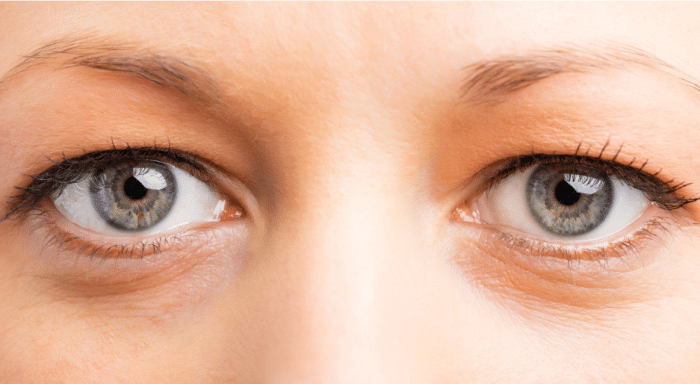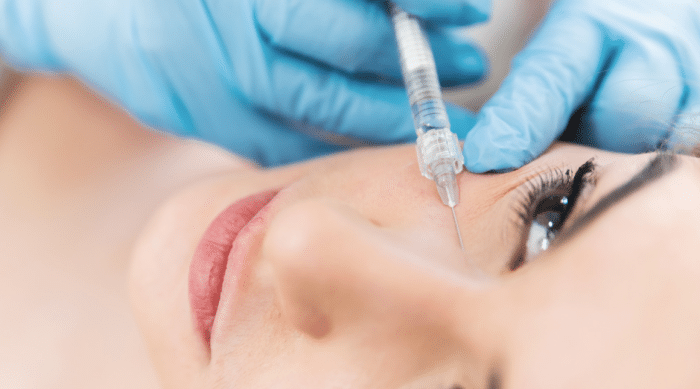Only for Licensed Professionals
Only for Licensed Professionals

The Eye-Opening Truth: Exploring the Use of Dysport Under the Eyes
David Fuller
Last Updated On: April 9, 2024
According to the American Society of Plastic Surgeons, the popularity of non-surgical anti-aging solutions has been on the rise in recent years, as evidenced by the significant increase in the use of neurotoxin injectables like Dysport. This statistic emphasizes the demand for cosmetic enhancements and opens the door to examining Dysport’s specific application under the eyes.
Dysport, a botulinum toxin, is traditionally lauded for its efficacy in smoothing forehead lines and crow’s feet. However, its use under the eyes represents a nuanced application that addresses the delicate and challenging issues of under-eye wrinkles and fine lines.
The treatment’s intricacies, benefits, and considerations remain a topic of interest and debate among experts and patients alike. This article will explore the eye-opening truth about using Dysport under the eyes.
Key Takeaways
- Dysport’s growing popularity for non-surgical anti-aging highlights a demand for under-eye cosmetic enhancements to address wrinkles and fine lines.
- Applying Dysport under the eyes involves nuanced considerations due to the potential risks of weakening supportive muscle structures.
- The Dysport treatment process is quick and aims for a youthful appearance with minimal discomfort, showing results within 3-7 days.
- While Dysport is broadly safe and effective for facial wrinkles, careful patient selection and professional consultation are essential due to potential side effects.
Understanding Under-Eye Concerns

Delve into the common issues and underlying factors contributing to under-eye wrinkles and bags, a concern for many seeking a youthful and refreshed appearance.
Common Under-Eye Problems
Under-eye problems can significantly impact one’s appearance, leading to fears of looking tired or older. The most common issues include:
- under-eye hollows
- skin laxity around the eyes
- under-eye puffiness (also known as festoons)
- dark circles
- visible blood vessels
- expression wrinkles
- sagging facial skin
These problems may arise due to various factors, including natural aging, which leads to volume loss, decreased elasticity, and reduced collagen in the skin.
Causes of Under-Eye Wrinkles and Bags
Under-eye wrinkles and bags are primarily caused by weakening tissue structures and muscles around the eyes as one ages. Factors contributing to their appearance include fluid retention, lack of sleep, allergies, smoking, and genetics.
Conditions like dermatitis, renal disease, and thyroid eye disease may also play a role. A high-salt diet, allergies, and medical conditions such as thyroid problems can lead to swelling. At the same time, natural aging contributes to the loss of skin firmness and muscle weakening around the eyes.
What Is Dysport?
Discover Dysport, a botulinum toxin-based treatment, how it smooths wrinkles, and its differences from other neurotoxins used in cosmetic procedures.
Overview of Dysport and Its Mechanism
Dysport is a botulinum toxin that acts as a muscle relaxant. It is designed to reduce the appearance of wrinkles by temporarily inhibiting muscle contractions. Using Dysport for expression lines around the eyes and forehead is common, but applying muscle relaxants directly under the eyes may worsen conditions by weakening the supportive muscle.
However, these treatments can be effective for crow’s feet, which are lines that form at the corners of the eyes due to squinting and contribute to an aged look. While Dysport is generally well-received for treating crow’s feet, potential side effects can include temporary muscle weakness, bruising, swelling, or redness at the injection site.
In rare cases, if the toxin spreads beyond the treatment area, it may also cause more systemic symptoms like headache or eyelid drooping. As with any cosmetic procedure, it is essential to discuss the risks and benefits with a healthcare professional before proceeding.
How Dysport Differs from Other Neurotoxins
Dysport is similar to other botulinum toxin products like Botox and Jeuveau in that it aims to smooth wrinkles and improve the appearance of the skin. The primary differences among these products lie in their formulation, onset of action, and duration of effect. It is essential to consult a healthcare professional to determine the most suitable option.
Dysport for Under-Eye Treatment
Explore the potential of Dysport injections for rejuvenating the under-eye area, addressing concerns such as wrinkles and puffiness for a more youthful look.
Suitability of Dysport for the Eye Area
Dysport is suitable for men and women over 18 looking to address signs of aging, make minor cosmetic adjustments, or manage certain medical conditions. It is prevalent for treating crow’s feet around the eyes, significantly enhancing a youthful appearance.
However, it is not recommended for those who are pregnant or breastfeeding, have allergies to its components, have skin infections at the treatment site, have neurological disorders, or are seeking treatment for deep wrinkles, folds, or scars.
Benefits of Using Dysport Under the Eyes
Using Dysport under the eyes can help manage the appearance of fine lines and the muscular ridge known as the under-eye jelly roll. When injected carefully, Dysport can smooth out the puffiness and lines under the eyes without compromising facial expressions, providing a more refreshed and youthful look.
The overall procedure is quick, with minimal discomfort, and the results can start to show within 3-7 days, peaking in about two weeks.
The Treatment Process

Dive into the steps involved in undergoing Dysport treatment, from initial consultation and assessment through the injection procedure to post-treatment care and expectations.
Consultation and Assessment
Before proceeding with Dysport injections, a thorough consultation is conducted to discuss medical history and aesthetic goals. This step is crucial for tailoring the treatment plan to individual needs and preferences. Some patients prefer slight facial movement, while others opt for a more static appearance, affecting the Dysport dosage.
The Injection Procedure Explained
The Dysport injection process is brief, generally taking 10-15 minutes. The area to be treated is sanitized, and then the injection points are marked. Using an ultra-fine needle, Dysport is carefully injected into targeted areas. There’s an option to use a topical numbing cream beforehand to minimize discomfort.
Post-Treatment Expectations and Care
Post-treatment, patients can expect minor redness, swelling, and possibly bruising, which typically resolve within a few hours to days. It’s advised to avoid rubbing the treated area and to refrain from strenuous activities for 24-48 hours. Dysport treatment costs vary depending on the injection area, number of units used, and the practitioner’s experience, with prices generally ranging between $300 and $600 per area.
Safety and Efficacy
Delve into Dysport’s safety measures and effectiveness as a reliable solution for under-eye treatment. Its robust safety profile and proven results in cosmetic enhancements underline its effectiveness.
Understanding the Safety Profile of Dysport
Dysport is generally well-received, but like any medical treatment, it has specific contraindications and potential side effects. It’s contraindicated for patients with known hypersensitivity to any botulinum toxin product or cow’s milk protein. The most common adverse reactions include muscular weakness and dysphagia in adults and respiratory infections in pediatric patients.
Severe hypersensitivity reactions, although rare, can occur. The safety of Dysport is backed by extensive clinical trials and real-world use, indicating it carries a remote risk for transmission of viral diseases due to its human albumin content.
Efficacy of Dysport for Under-Eye Treatment
Dysport has proven efficacy in treating upper limb spasticity in adults, with significant improvements in muscle tone and Physician Global Assessment scores, demonstrating its potent neuromodulatory capabilities. While specific studies on under-eye treatment are less common, Dysport’s efficacy in managing related muscle tension suggests potential benefits in the under-eye area, such as reducing fine lines and puffiness.
Conclusion
Dysport represents a promising solution for those seeking to address the aesthetic challenges associated with aging, particularly around the eye area. Its capability to smooth out fine lines and reduce puffiness, coupled with a relatively quick and minimally invasive procedure, makes it an attractive option for individuals looking to rejuvenate their appearance.
However, the precise application of Dysport under the eyes requires careful consideration of potential benefits and risks, underscoring the importance of consulting with experienced professionals. While its safety and efficacy for broader cosmetic uses are established, further research and clinical experience will likely provide deeper insights into its suitability for under-eye treatments.
FAQs
- What is Dysport used for?
Dysport is used to reduce the appearance of wrinkles and fine lines, especially around the eyes and forehead, through temporary muscle relaxation.
- How quickly can I see results after Dysport treatment?
Results from Dysport injections typically become visible within 3-7 days after treatment.
- Is Dysport safe for under-eye treatment?
Dysport is generally safe, but its application under the eyes should be approached with caution and professional advice due to the sensitive area’s sensitivity.
- How long do the effects of Dysport last?
The effects of Dysport can last for up to 4-6 months, depending on the individual’s response to the treatment.
- Can anyone get Dysport injections?
Dysport is suitable for adults over 18 seeking cosmetic improvements, except for those pregnant, breastfeeding, allergic to its components, or with certain neurological disorders.
Dysport is a prescription medication that should only be administered by a licensed healthcare professional. While some websites may offer Dysport for sale online, it is highly advised against purchasing it without a prescription or medical supervision. To ensure safety and efficacy, it’s crucial to consult with a qualified healthcare provider who can assess your suitability for Dysport treatment and administer it appropriately.
References
American Society of Plastic Surgeons. (n.d.). Plastic surgery statistics. Retrieved from https://www.plasticsurgery.org/news/plastic-surgery-statistics
Galderma. (2019, April 30). A decade of Dysport®: Galderma celebrates 10 years since FDA approval of Dysport in the US. Retrieved from https://www.galderma.com/news/decade-dysportr-galderma-celebrates-10-years-fda-approval-dysport-us
Gracies, J. M., Brashear, A., Jech, R., McAllister, P., Banach, M., Valkovic, P., Walker, H., & Marciniak, C. (2017). Efficacy and safety of abobotulinumtoxinA for the treatment of hemiparesis in adults with upper limb spasticity previously treated with botulinum toxin: Subanalysis from a phase 3 randomized controlled trial. PM & R, 9(10), 960-968. https://doi.org/10.1016/j.pmrj.2017.06.007
Dysport® (abobotulinumtoxinA). (n.d.). Retrieved from https://www.dysport.com/en-us
Products
Cart
Log In
Newsletter
Subscribe for exclusive offers and updates on new arrivals
Share feedback at:
Working Hours
MON - SUN 9AM to 6PM EST
The Most Popular Brands
Med Supply Solutions
Support
Secure checkout is guaranteed with full adherence to PCI DSS payment standards.
Products listed here are guaranteed authentic and manufacturer-sourced.
Pay easily with trusted providers


*Google and Apple Pay are currently only available via a direct link provided by your account manager.
Copyright 2025. Med Supply Solutions